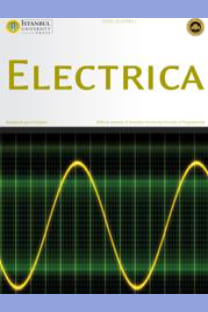KALMAN FILTERING FOR SPACE-TIME CODED TRANSMISSIONS OVER FREQUENCY-SELECTIVE RAYLEIGH FADING CHANNELS
KALMAN FILTERING FOR SPACE-TIME CODED TRANSMISSIONS OVER FREQUENCY-SELECTIVE RAYLEIGH FADING CHANNELS
Equalizers, Kalman filters Rayleigh fading channels, space-time codes,
___
- Lindbom, L., “Simplified Kalman estimation of fading mobile radio channels: high performance at LMS computational loads”, IEEE International Conference on Acoustics, Speech and Signal Processing, Vol. 3, pp. 352-355, Liu, Z., Ma, X., Giannakis, G.B., “Space-time coding and Kalman filtering for time-selective fading channels”, IEEE Transactions on Communications, Vol. 50, No. 2, pp. 183-186, Cozzo, C., Hughes, B.L., “An adaptive receiver for space-time trellis codes based on per-survivor processing”, IEEE Transactions on Communications, Vol. 50, No. 8, pp. 1213-1216,
- Gerstacker, W.H., Obernosterer, F., Schober, R., Lehmann, A.T., Lampe, A., Gunreben, P., “Equalization concepts for Alamouti’s space- time block code”, IEEE Transactions on Communications, Vol. 52, No. 7, pp. 1178-1190,
- Al-Dhahir, N., Sayed, A.H., “The finite-length multi-input multi-output MMSE-DFE”, IEEE Transactions on Signal Processing, Vol. 48, No. , pp. 2921-2936, 2000.
- Alamouti, S.M., “A simple transmit diversity technique for wireless communications”, IEEE Journal on Select Areas in Communications, Vol. 16, No. 8, pp. 1451-1458, 1998.
- Al-Dhahir, N., “Overview and comparison of equalization schemes for space-time-coded signals with application to EDGE”, IEEE Transactions on Signal Processing, Vol. 50, No. , pp. 2477-2488, 2002.
- Firmanto, W., Vucetic, B.S., Yuan, J., “Space- time TCM with improved performance on fast fading channels”, IEEE Communications Letters, Vol. 5, No. 4, pp. 154-156, 2001.
- Ahmet Korhan Tanç was born in İzmir, Turkey, in 1978. He received the B.Sc. and M.Sc.
- (honors) degrees in electrical and electronics engineering from the Dokuz Eylül University, Turkey, in 2001 and 2004 respectively. He is currently research assistant of telecommunications at the Dokuz Eylül University. His research interests include channel coding, equalization and adaptive signal processing.
- Reyat Yılmaz was born in Antakya, Turkey, on October 7, 1963. He received the B.Sc. and M.Sc. degrees in electrical and electronics engineering from the Dokuz Eylül University, İzmir,
- Turkey, in 1986 and 1988 respectively. During the M.Sc. education he worked at the same
- ISSN: 2619-9831
- Yayın Aralığı: 3
- Başlangıç: 2001
- Yayıncı: İstanbul Üniversitesi-Cerrahpaşa
THE ADAPTIVE CHANNEL ESTIMATION FOR STBC-OFDM SYSTEMS
CONTROL-ORIENTED MODELLING OF FUEL PROCESSING REACTORS IN FUEL CELL POWER SYSTEMS
APPLICATION OF NONLINEAR PID CONTROLLER IN SUPERCONDUCTING MAGNETIC ENERGY STORAGE
Min XIE, Jinfu CHEN, Xianzhong DUAN
M. Nusret SARISAKAL, M. Ali AYDIN
GENETIC ALGORITHM BASED SHORT-TERM SCDEDULING OF REACTIVE POWER CONTROLLERS
Husam SHAHEEN, Jia MA, Shijie CHENG
THE DESIGN OF THE HEAT SINKING IN HV-VFD
Dan WANG, Chengxiong MAO, Jiming LU
STUDY OF THE IMPACTS OF UPFC UPON DYNAMIC POWER QUALITY
